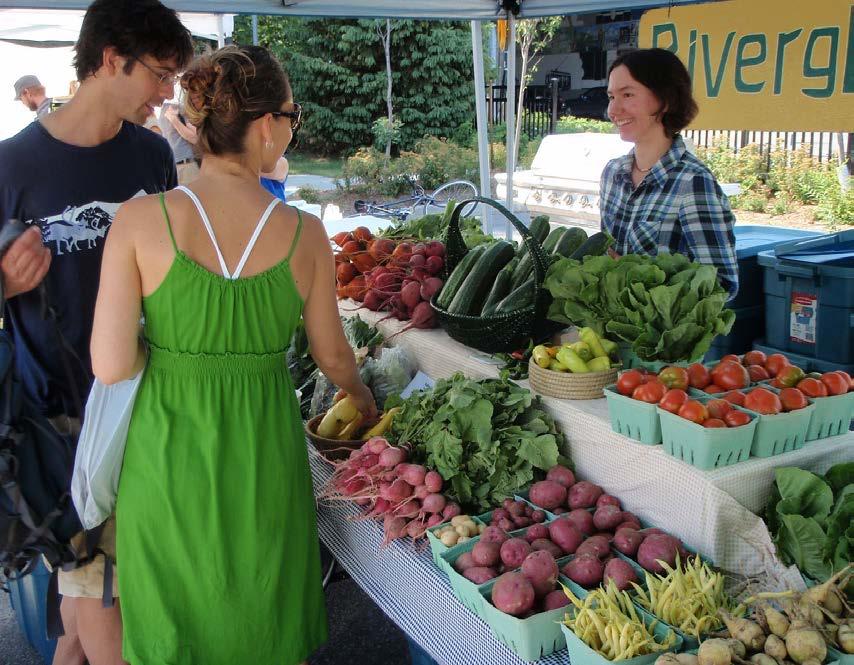
3 minute read
Eat local and buy a “share” from the farm
EAT LOCAL AND BUY A “SHARE” FROM THE FARM Community supported agriculture makes customers part of the picture
By Leslie Foster | Photos by Riverglen Farm
Advertisement
“Eating local” – buying food from as close to home as possible – means better taste and nutrition because food hasn’t been draining nutrients in storage or aboard a truck before it gets to the table.
Washing fresh produce before it's purchased.
Eating local also means a reduced carbon footprint. No need for fuel and the accompanying emissions to ship food from California, Mexico or Peru to supply fresh veg to northerners.
And now there’s another road to that healthy meal besides local produce markets. It’s called “community supported agriculture,” CSA for short.
Here’s how it works. Consumers pre-pay participating farms for a summer season of deliveries, in effect buying a “share” of a farm’s products. This helps farmers plan crops and smooth out cash flow when it’s time to pay for seed, potting soil, seedling trays, and fuel to heat the greenhouses.
Buying a “share” from a CSA farm means you take on some of its rewards and risks and get closer to your food source. You benefit from bumper crops and accept low yields when crops are poor due to bad weather, pests or disease.
TICKETS NOW AVAILABLE Ottawa RIVERKEEPER
Wednesday, May 27th 2015 RIVERKEEPERGALA.COM

Because our river is worth protecting.
Presented by:
Protect what matters.

Be smart and prepare a Legal Will before your trips and adventures. CALL FOR A QUOTE TODAY! BECAUSE ANYTHING CAN HAPPEN IN THE OUTDOORS.
www.georgebrownlaw.com
For your WILLs, POWER of ATTORNEY and assistance with other LEGAL MATTERS. Tel: 613-731-2453 Fax: 613-249-7060 George@georgebrownlaw.com | www.georgebrownlaw.com
By paying early – between $30 and $36 per week – and sharing some of the risk, you get a discount on weekly food shipments, or more to eat than if you paid the same price at the market. Customers can pick up their share at their farm, at a designated pickup location, or at a public market.
Some CSA farms offer meats (for a higher weekly fee), free-range eggs, honey, maple syrup, herbs and more. Most welcome visiting customers who come to see how crops are raised and how the animals are treated.
Members get their shares weekly or bi-weekly over 16 weeks starting at the end of June. Each box includes a variety of vegetables, possibly some you’ve never tried before.
Daizy and Johnny Näf have owned and operate Luxy Farm in St. Albert, a half-hour drive east of Ottawa, for six years. With a young child and another on the way Daizy explained, “I used to be in the field, but now I mostly work in the office and Johnny does garden management and directs the interns.” (Many CSA farms host summer interns. They get room and board and a small stipend. Most come to learn about community supported agriculture and supply cheap labour. The Näf interned before starting their own farm.)
Daizy and Johnny, both musicians, met while working in a restaurant. Then Johnny’s father passed away and he inherited the farm. Daizy says the big CSA reward is feedback from longtime clients. “Direct marketing is wonderful compared to sending your produce to a wholesaler and never seeing customers.”
Another CMA producer is David Burnford of Riverglen Biodynamic Farm; it’s inside city limits near the Ottawa River in the west end. He wanted a job where the outdoors would be part of his everyday life, working with his hands, but with opportunity for creativity.
He got a horticultural degree at Algonquin


College, but, “Landscaping and chemicals didn’t appeal to me so in 2006 I did an internship at an organic farm in B.C.” In 2007, back in Ontario, he started a 15-share CSA. That first year, he lived in the barn at Riverglen and rode his electric-assisted bicycle towing a trailer to sell his produce at the market.
Riverglen has three cows and 20 chickens and produces ethically raised beef, chicken, and eggs.
Burnford says he’s learned a lot over the past nine years and feels that he has found his calling.
For him, the most important challenge farming faces is “to get young people interested, and make farming sexy again.”
T he Ontario CSA Farm Directory could make you part of the picture. It’s at csafarms.ca.









